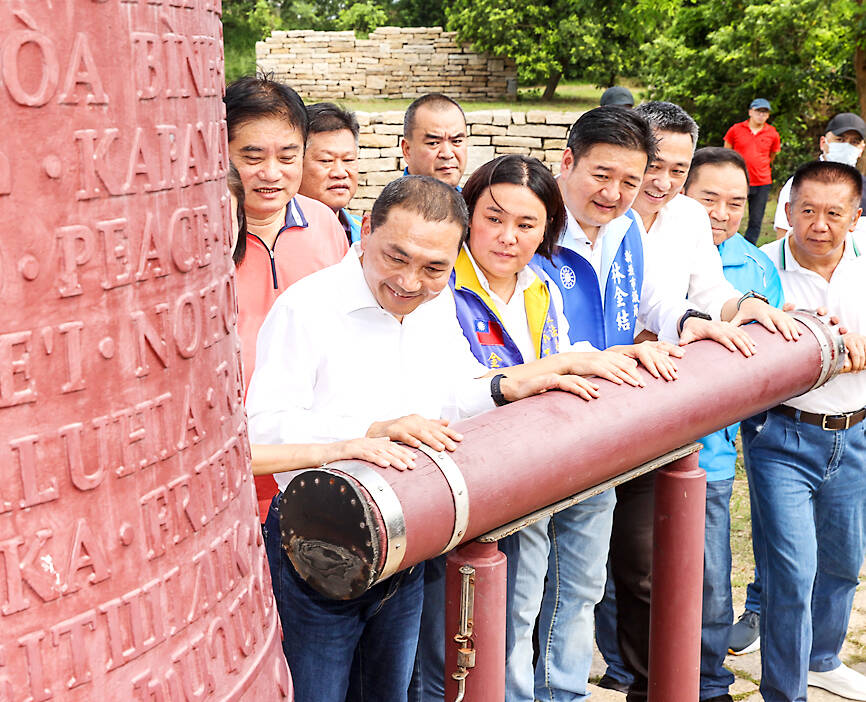New Taipei City Mayor Hou You-yi (侯友宜), the Chinese Nationalist Party’s (KMT) presidential candidate, yesterday proposed transforming Kinmen County into a cross-strait economic pilot zone and transportation hub to help facilitate peaceful exchanges between Taiwan and China.
During a trip to Kinmen, which is less than 10km from southeast China, Hou said that turning the area into an economic pilot zone that offers tax incentives would help attract Chinese investment in to the county.
He said that if elected in January next year he would enhance the major ports in Kinmen and increase the frequency of flights in and out of the county to make the zone possible.

Photo: CNA
He also proposed that Kinmen become a medical and healthcare hub, not only to solve the longstanding problem of a lack of medical resources in the county, but also to make it a destination for Chinese medical tourists.
The KMT candidate said that Kinmen should import electricity and natural gas from China’s Fujian Province to ensure supply, after it began importing water from Jinjiang, China, in 2018.
Regarding a proposal by some Kinmen residents to construct a bridge linking the county with Xiamen, China, Hou said that he is open to all opinions and respects the wishes of Kinmen residents who plan to hold a referendum on the issue.
He said that his support of a referendum and of importing electricity and natural gas from China are based on the condition that doing so would not negatively affect Taiwan’s national security.
The proposal for a Kinmen-Xiamen bridge has previously been criticized by the Democratic Progressive Party (DPP) as posing a national security risk should China invade.
Hou arrived in Kinmen yesterday afternoon, a day before the 65th anniversary of the 823 Artillery Bombardment of the county, a key battle that marked the beginning of the Second Taiwan Strait Crisis.
On Aug. 23, 1958, nine years after the Republic of China (ROC) government retreated from China to Taiwan after losing the Chinese Civil War, Chinese communist forces attacked Kinmen. Over the next 44 days, 475,000 artillery shells were fired at the islands in an attempt to take them over.
In his news conference, Hou thanked Kinmen residents for standing on the front line of defending the ROC from invasion 65 years ago.
The country’s prosperity and democracy would forever be indebted to them for their contributions, he said.
Hou reiterated his support for a version of the so-called “1992 consensus” that conforms with the Constitution, without elaborating.
He said that he would try to reopen dialogue with China on equal footing to prevent a cross-strait war, because “there can be no losers in peace and no victors in war.”
The “1992 consensus” — a term that former Mainland Affairs Council chairman Su Chi (蘇起) in 2006 admitted making up in 2000 — refers to a tacit understanding between the KMT and the Chinese Communist Party that both sides of the Taiwan Strait acknowledge that there is “one China,” with each side having its own interpretation of what “China” means.
Beijing shut down its official communication channel with Taiwan after the DPP, which has refused to accept the “1992 consensus,” came to power in May 2016.
The DPP says it does accept the “1992 consensus” on the grounds that Beijing has never acknowledged the ROC’s existence and that agreeing to the consensus implies acceptance of China’s claim over Taiwan.

A strong continental cold air mass is to bring pollutants to Taiwan from tomorrow, the Ministry of Environment said today, as it issued an “orange” air quality alert for most of the country. All of Taiwan except for Hualien and Taitung counties is to be under an “orange” air quality alert tomorrow, indicating air quality that is unhealthy for sensitive groups. In China, areas from Shandong to Shanghai have been enveloped in haze since Saturday, the ministry said in a news release. Yesterday, hourly concentrations of PM2.5 in these areas ranged from 65 to 160 micrograms per cubic meter (mg/m³), and pollutants were

Taiwan’s armed forces have established response protocols for a wide range of sudden contingencies, including the “Wan Chun Plan” to protect the head of state, the Ministry of Defense (MND) said today. After US President Donald Trump on Saturday launched a series of airstrikes in Venezuela and kidnapped Venezuelan President Nicolas Maduro, concerns have been raised as to whether China would launch a similar “decapitation strike” on Taiwan. The armed forces regularly coordinate with relevant agencies and practice drills to ensure preparedness for a wide range of scenarios, Vice Minister of National Defense Hsu Szu-chien (徐斯儉) told reporters before a

EVA Airways on Saturday said that it had suspended a pilot and opened an investigation after he allegedly lost his temper and punched the first officer several times as their plane was taxiing before takeoff at Los Angeles International Airport. According to a report published on Thursday by The Reporter, the incident occurred after the flight’s Malaysian first officer tried to warn the Taiwanese pilot, surnamed Wen (文), that he was taxiing faster than the speed limit of 30 knots (55.6kph). After alerting the pilot several times without response, the first officer manually applied the brakes in accordance with standard operating

The New Taipei City Social Welfare Department on Thursday celebrated Paralympic competitor Chen Tzu-wei (張孜維), who received last year’s national Golden Eagle award for exemplary achievement by Taiwanese with disabilities. Chen, who suffers from childhood-onset muscular dystrophy, did not attend the first award ceremony held by the Ministry of Health and Welfare in November due to illness. Chen was formally presented with the award at the department, where he gave thanks to government workers for supporting his education and livelihood, the department said in a statement. Chen was raised by the Ai-hsin Home for Persons with Disabilities in the city’s Bali District (八里)